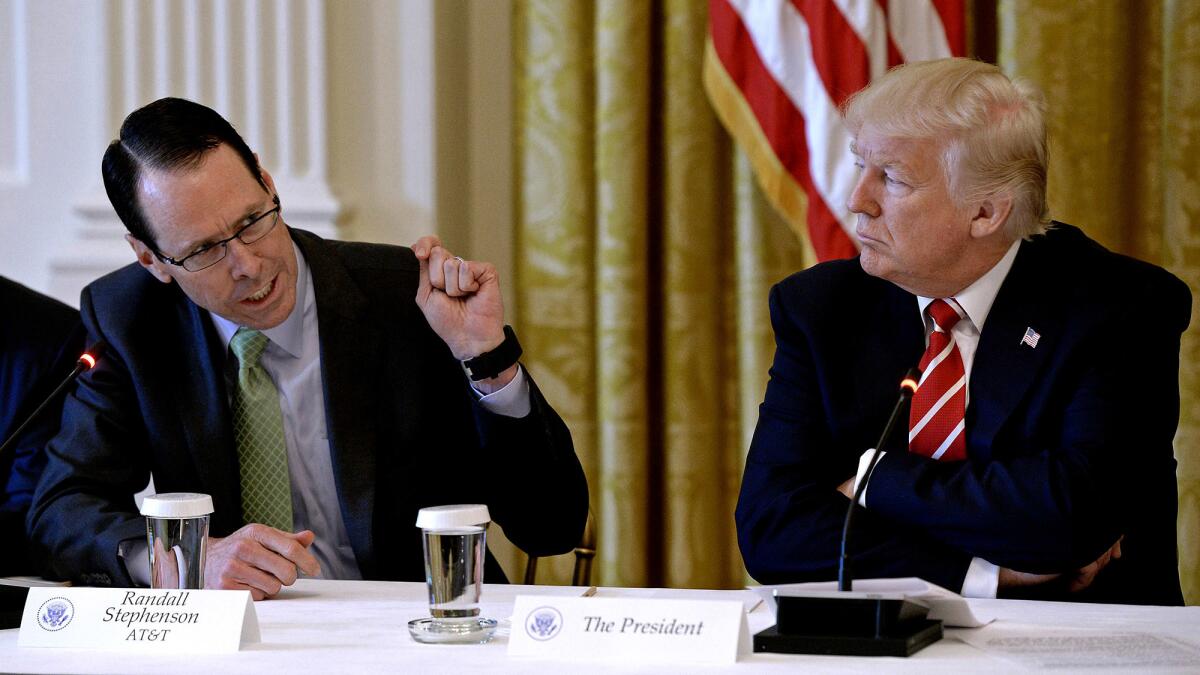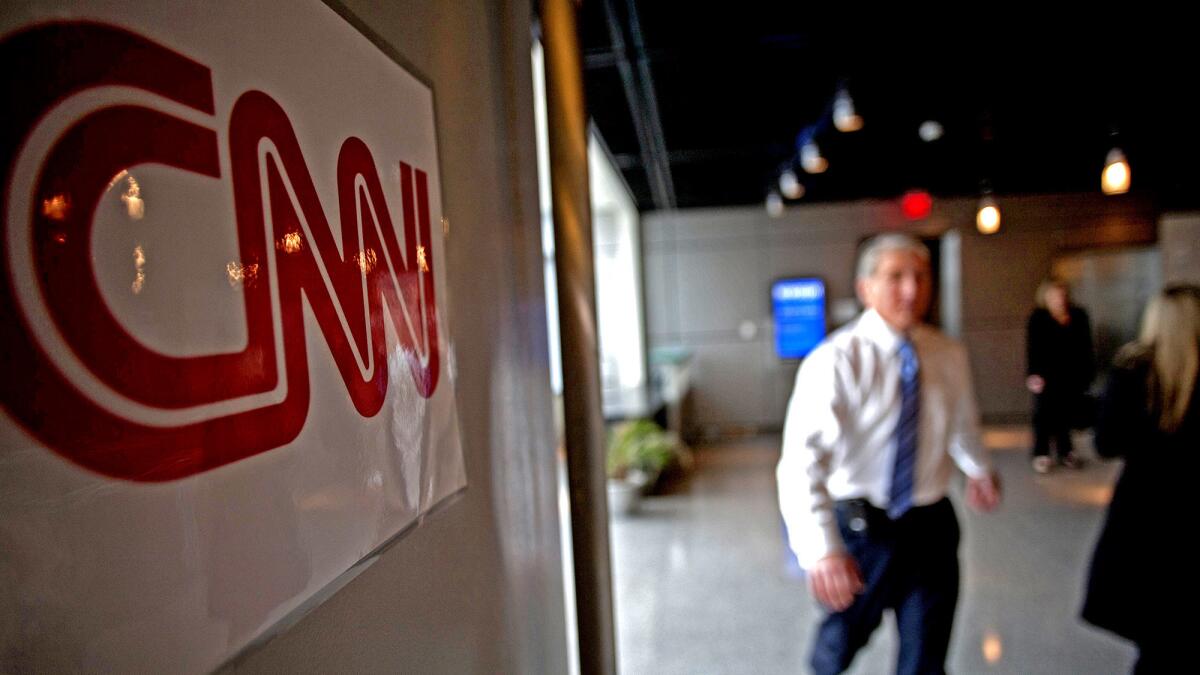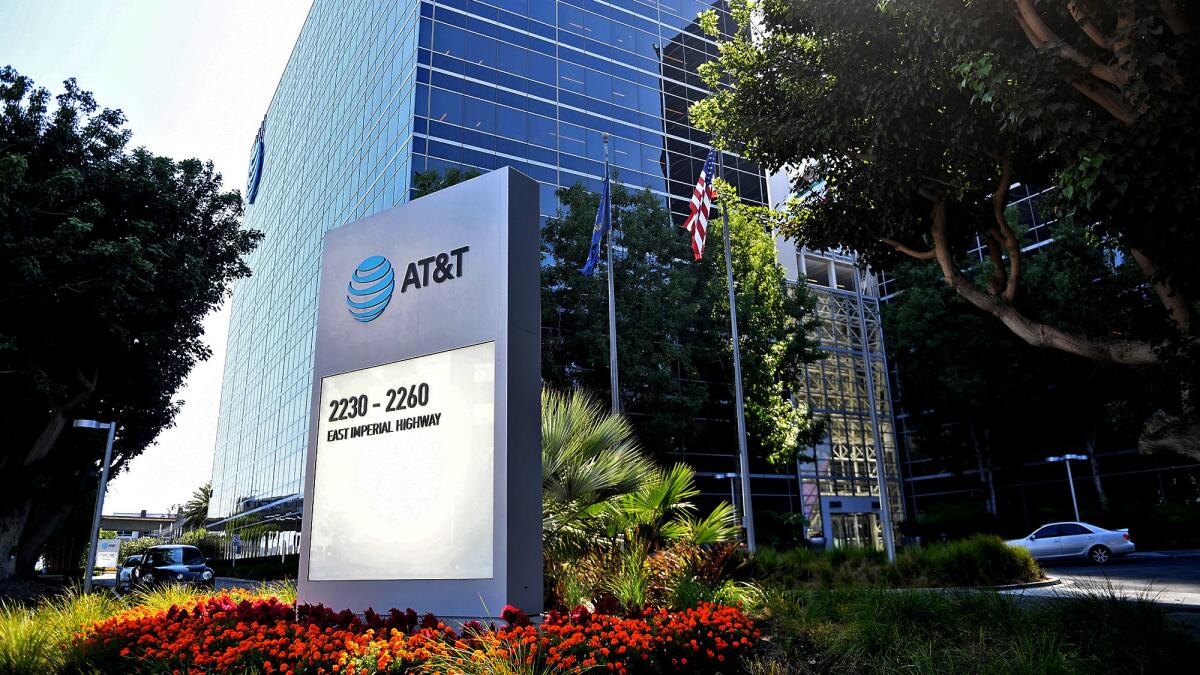AT&T and Justice Department are on a collision course over Time Warner merger
- Share via
Two titans — the U.S. Justice Department and telecommunications giant AT&T Inc. — are locked in a high-stakes showdown to decide who controls some of the nation’s most popular television channels.
The Justice Department sued to block AT&T’s planned $85-billion purchase of Time Warner Inc., the New York media company that owns HBO, CNN, TNT, TBS, Cartoon Network and Hollywood’s largest movie and TV studio, Warner Bros. The dispute — a rare standoff in an antitrust case — will be decided by a federal judge after a trial that begins Monday in Washington, barring a last-minute settlement.
The government alleges that AT&T, which already owns the nation’s largest pay-TV provider, DirecTV, would use its added clout to bully others, freeze out new entrants in the TV industry and increase rates for consumers. The Dallas phone company scoffs at such concerns, saying the prices for TV service should go down — not up — if AT&T wins its prize.
The trial’s outcome will go far beyond who produces the next Batman movie. Experts say that if AT&T prevails, the trend of media consolidation probably will accelerate. A loss by AT&T could chill the market for blockbuster media mergers.
The case also could help shape how traditional television is incorporated into mobile phone offerings. AT&T wants to use CNN, HBO and other networks as incentives to keep customers on their mobile phones. The company also has said it could produce bigger profits by weaving advertising messages relevant to consumers into content streamed on phones.
“This is an important case in the fast-evolving industry of video distribution,” said Douglas Melamed, a Stanford Law School professor. “But these are difficult cases, and that’s why we don’t see too many of them.”

In the run-up to the trial, there has been much speculation over whether President Trump is behind the government’s effort to scuttle the AT&T-Time Warner deal. Trump has long been opposed to the merger, first denouncing it in October 2016, when the deal was announced. Since arriving in Washington, Trump has threatened to use the Justice Department to punish political rivals, such as Hillary Clinton, and he has long groused about CNN’s unflattering coverage of him. During a campaign rally last weekend in Pennsylvania, the president again belittled the channel, calling it “fake as hell — the worst.”
Last week, a group of prominent former Justice Department officials, including former Nixon White House Counsel John Dean, former U.S. Atty. Preet Bharara of New York and former Immigration and Customs Enforcement Director Sarah R. Saldaña, sounded an alarm. In a court document, they said White House meddling would amount to selective law enforcement, which is unconstitutional. Both Bharara and Dean are paid CNN analysts, but they said they were speaking for themselves, not the cable network.
“There’s been a lot of suspicion about whether the trial has anything to do with the president’s well-publicized distaste for CNN,” said Scott Martin, a partner and antitrust expert with law firm Hausfeld in New York. “But I don’t think that’s what is driving this case.”
U.S. District Judge Richard Leon also seemed skeptical. Last month, the presiding judge denied AT&T’s request to review White House call logs to see whether there had been communications with the Justice Department. AT&T failed to prove it was a victim of selective enforcement, the judge ruled.
Martin said the case instead illustrates how government regulators have become more aggressive in challenging mergers that might be anti-competitive. “We’ve got a Justice Department that, in recent years, has been unafraid to take a case to trial,” he said, citing a federal trial in 2014 over whether American Express had violated antitrust laws by steering customers to certain credit cards.
He said the Justice Department has bolstered its ranks with established litigators from private practice. And in late September, Trump’s new antitrust chief, Makan Delrahim, took office. Delrahim, who now serves as assistant attorney general, immigrated with his family to the U.S. from Iran when he was a boy, and they settled in Los Angeles.
He has expressed opposition to the Justice Department’s previous tactic of adding a long list of remedies as conditions for a merger approval. Such behavioral remedies, Delrahim has said, are difficult to enforce, and thus, largely ineffective. Instead, he prefers divestitures.
In this case, AT&T refused the government’s demand that it divest some of the Time Warner networks or DirecTV.
Prominent Los Angeles attorney Daniel Petrocelli is on the other side, leading AT&T’s and Time Warner’s large legal team. Petrocelli won a wrongful death civil verdict against O.J. Simpson when he represented the families of Ronald Goldman and Nicole Brown Simpson. He also successfully defended Walt Disney Co. more than a decade ago in a case over Winnie the Pooh royalties.
AT&T Chief Executive Randall Stephenson has said the company has been preparing its case for nearly 18 months.
“Since the day we’ve announced this, we’ve been preparing to litigate this deal, and we have been working very diligently on a litigation strategy and a litigation plan,” Stephenson said at a November investor conference.

The burden is on the government to prove that AT&T would use HBO, TBS, CNN and other networks as weapons to harm competitors.
AT&T is the nation’s largest pay-TV provider with more than 25 million customer homes through its DirecTV and U-Verse television services. It also boasts more than 100 million customers for mobile phone service, which is increasingly important as phones have become screens of choice for younger consumers.
But the company has been struggling to remain dominant amid dramatic changes in consumer behavior. Three years ago, AT&T spent $67 billion, including debt, to buy DirecTV. Since then, the El Segundo satellite TV service has been bleeding customers. AT&T, in court filings, acknowledged that DirecTV and U-Verse combined lost 1.2 million subscribers in 2017.
Consumers are ditching satellite dishes in favor of less-expensive streaming options, known in the industry as over-the-top services, which are delivered via internet connections.
“In only a few years, this phenomenon of ‘over the top’ premium video has irreversibly reshaped the landscape for the creation and delivery of television content, pushing all players in the market to respond in numerous ways that benefit consumers,” AT&T and Time Warner said in their pretrial filing.
The government, however, doubts that AT&T will play nice given the intense pressure on its business. It argues that AT&T has an incentive to coordinate with the nation’s other major pay-TV operator, Comcast Corp., to thwart competitors that might try to muscle onto their turf.
“Prior instances have shown that the industry is vulnerable to coordination,” the government said.
It pointed to the rocky rollout of the Los Angeles Dodgers’ television channel, SportsNet LA, in 2014. Two years later, the Justice Department sued DirecTV and AT&T, alleging collusion among pay-TV operators in Los Angeles. In that case, the government argued that a high-level DirecTV executive shared information with rival executives at other pay-TV companies, which all declined to carry the channel.
That case was eventually settled, but DirecTV still does not offer the Dodgers’ channel, citing its price tag.
“These incidents are irrelevant, yet the government persists in pursuing them,” AT&T and Time Warner said in their filing.

Some of the same antitrust lawyers who prepared the Dodgers channel lawsuit are now working to block AT&T’s merger with Time Warner.
But not everybody believes the government’s effort will be successful.
“The Justice Department has a tremendous uphill climb,” said David A. Balto, an antitrust expert in Washington. “They are going to have to bring some compelling evidence or else it will be like batting against the Dodgers’ Clayton Kershaw when you have two strikes against you.”
Balto and other experts said the government typically does not challenge so-called vertical mergers – combinations of different parts of the supply chain. Historically, those deals have not been viewed as anti-competitive, unlike horizontal mergers, which are tie-ups of direct rivals.
In fact, the Justice Department allowed a similar vertical merger in 2011 when it approved Comcast’s acquisition of media giant NBCUniversal.
“I think the government has had some seller’s remorse on that one,” said Martin, the attorney.
Before it was owned by AT&T, DirecTV protested the marriage of Comcast and NBCUniversal. DirecTV told the government that Comcast would become too powerful if it owned TV channels as well as the distribution system.
Leon, the judge, also was involved with that Comcast case. He made headlines when he threw out an initial agreement between the Justice Department and Comcast. Leon demanded the government strengthen the Comcast merger conditions, which expire later this year.
“This will be a very interesting trial to watch,” Martin said.
More to Read
Inside the business of entertainment
The Wide Shot brings you news, analysis and insights on everything from streaming wars to production — and what it all means for the future.
You may occasionally receive promotional content from the Los Angeles Times.











